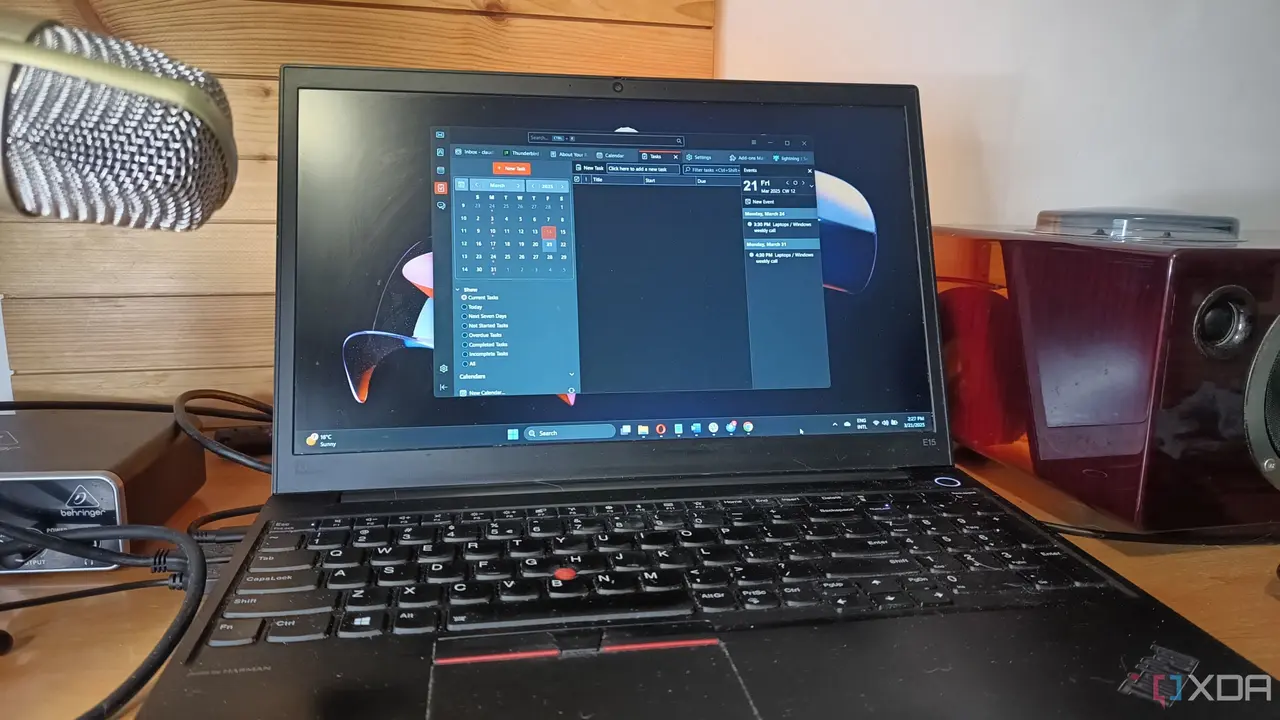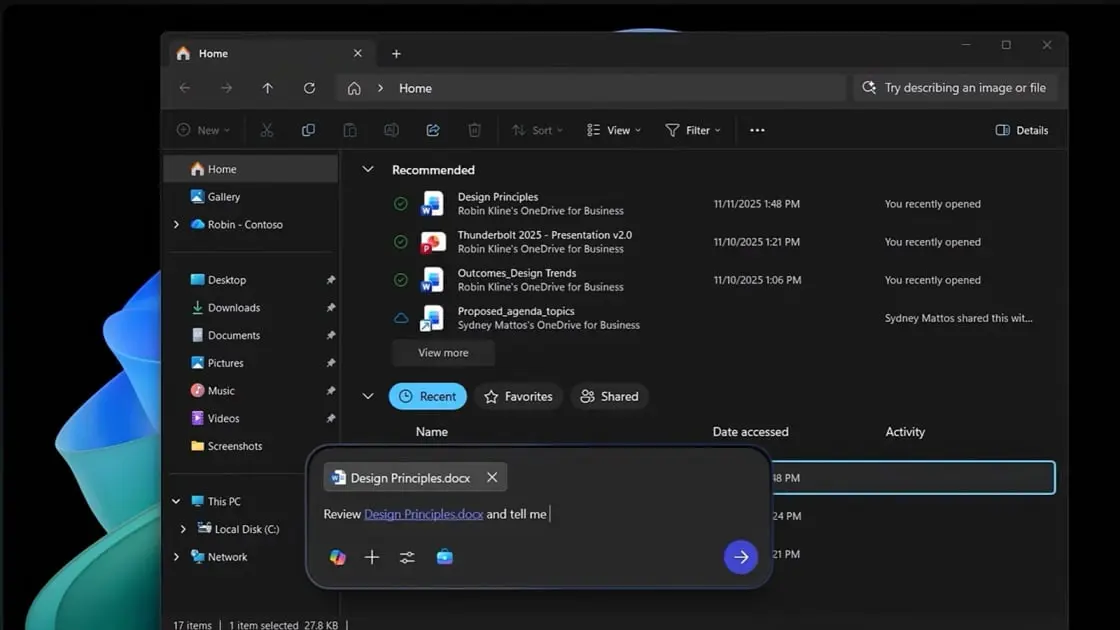Microsoft Unveils AI-Powered Windows Search for Copilot+ PCs
8 Sources
8 Sources
[1]
Microsoft promises smarter, faster search with AI in Windows 11, but don't hold your breath
Serving tech enthusiasts for over 25 years. TechSpot means tech analysis and advice you can trust. Something to look forward to: Microsoft introduced a proper search feature in its PC operating systems with Windows Vista. Despite undergoing several iterations over the years, Windows search functionality still lacks the basic ability to provide consistent, reliable results when searching for files, applications, or settings. Is this finally going to change? Windows Search has long been one of the least enticing features of modern Windows systems, and this has remained true for a very long time. Microsoft recently vowed to improve local search through the power of AI, claiming that AI will revolutionize search engines, web browsers, and nearly everything else in the coming years. The company has started to showcase how AI will enhance search, and unpaid Windows beta testers can now get a sneak peek at these improvements by installing the latest Insider Preview Build of Windows 11. Microsoft recently released Windows 11 Insider Preview Build 26120.2992 (KB5050083) to the Dev Channel. One of the most notable changes introduced in this build is the improved Windows Search experience, which requires the 40+ TOPS NPU inside a Copilot+ PC system to perform its AI magic. According to Microsoft, finding documents, photos, or even system settings in Windows 11 will become significantly easier. The new OS build adds a "semantic indexing" layer on top of the traditional indexing feature, enabling users to perform search tasks in a conversational, prompt-like manner. Instead of searching for specific file names or exact keywords, users can now describe what they're looking for in their own words - such as "bridge at sunset" for photos - or even instruct the Settings app to perform tasks like changing the GUI theme. Currently, the AI-enhanced search is limited to local search, though Microsoft has plans to extend the feature to cloud storage and OneDrive. The feature will be gradually rolled out to Copilot+ PCs based on Snapdragon SoCs, with support for AMD and Intel-based systems planned for a later date. The new search supports a limited selection of widely used languages, including Chinese, English, French, German, Japanese, and Spanish. Similarly, the number of supported file formats is currently restricted to popular document and image types, such as: .txt, .pdf, .docx, .doc, .rtf, .pptx, .ppt, .xls, .xlsx, .jpg, .jpeg, .png, .gif, and .bmp. Users can customize Windows Search indexing settings through the Privacy & Security page in the Windows Settings app. There's even an "Enhanced" option to index the entire PC, though I've always advised against enabling system-wide indexing throughout my career in PC support. If you are looking for a powerful, fast, and reliable search solution and don't want to use AI, third-party tools like Everything effectively solved the "search problem" on Windows many years ago for me.
[2]
Microsoft wants AI to make searching for files a more casual experience
Microsoft is also testing AI-powered 'Click to Do' rewriting tools. Microsoft is testing an AI-powered search feature for Windows 11 that promises to end the days of organizing and naming your files well to find them later. Currently only available to testers with Copilot+ PCs, this new search tool uses semantic indexing to locate files with a conversational twist. So, instead of wracking your brain for precise filenames, you can now type casual queries like, "Where's that presentation I made last week?" With any luck, the AI will find it. The feature works across Settings, File Explorer, and the taskbar, covering standard file formats for images, documents, and spreadsheets. Since it relies on built-in AI models, there is no need for an internet connection. That said, the search will only work in locations you've chosen to index. You can index everything by switching to the new "enhanced" mode, but that might require more trust in Microsoft than is comfortable. Still, for those who feel their digital lives are scattered across desktops, downloads, and who-knows-where, the feature is definitely going to be helpful, even if it's limited to the computer for now. That means you can't search your cloud-stored OneDrive files yet, though Microsoft says that capability is on the way. Still, if you're not on a Copilot Plus machine, you're out of luck for now. The feature is a logical extension of Microsoft's AI agenda, which aims to weave AI tools across the company's products. On Copilot+ PCs, those tools include other features undergoing testing, like Click to Do, which lets users perform AI-powered tasks with a simple keyboard-and-mouse shortcut. You just highlight a chunk of text, hold the Windows key, and click to access a menu of options, including "Rewrite" and the grammar-correcting "Refine." Microsoft's AI ambitions are clearly all about making life easier for people, provided you've invested in the proper hardware. Shifting from rigid commands to a more human approach has obvious appeal. The days of typing exact filenames or endless keywords could be numbered. And it's a relatively small step from helping find your PowerPoint deck to helping you write it. Whether this is the killer app that gets people to buy a Copilot+ PC as Microsoft wants is still debatable. But if it can save you from renaming files with "final_final_v2" for the millionth time, it might just be worth it.
[3]
Microsoft opens testing for Windows AI search
Microsoft is testing AI-powered Windows search in a new dev channel build for Windows 11 Insider testers. Announced in October, it uses semantic indexing to let users search for local files using more casual language. Like other Microsoft AI features, you'll need a Copilot Plus PC to use it. The feature applies whether you're using search boxes in Settings, File Explorer, or the taskbar. And you don't need to be connected to the internet for it to work, thanks to the NPU chips on Copilot Plus computers. For now, AI search is limited to Windows settings and files with image and text formats that include JPEG, PNG, PDF, TXT, and XLS. Microsoft says that search only works for files in locations you've chosen to index. Users can tweak those locations using options found under Settings > Privacy & security > Searching Windows, or turn on "Enhanced" to index their whole machine. The company adds that the feature will eventually expand to include cloud data such as that stored in OneDrive. AI-powered Windows search "will gradually roll out to Windows Insiders on Snapdragon-powered Copilot+ PCs," Microsoft writes, with support for Intel or AMD Copilot Plus computers later. The feature will work for machines set to Chinese, English, French, German, Japanese, and Spanish languages. In addition to the new search, the build also includes AI writing tools offered by Click to Do, a feature that lets you choose from context-sensitive menus of options when you hold the Windows key down and left-click on your screen. Now, when you click a block of text and select Rewrite, there's a "Refine" option that can correct grammar for you.
[4]
Microsoft is bringing big upgrades to Windows Search for Copilot+ PCs -- here's what we know
With the end of Windows 10 in sight, Microsoft is making sweeping AI-focused changes to its portfolio of apps, including adding Copilot enhancements to Microsoft 365 (with a price hike). Now, it's bringing improvements to Windows Search. As announced in the Windows Insider post, Microsoft is working on an improved Windows Search feature to make finding documents, photos and settings across Windows 11 easier. However, it is currently only available to Windows Insiders in the Dev Channel with Snapdragon-powered Copilot+ PCs. This is due to the 40 TOPS (Trillions of Operations Per Second) NPUs on these PCs, such as a Snapdragon X Elite-equipped Dell XPS 13. Microsoft states this helps "search improvements work even when you're not connected to the internet." With the upgraded Windows Search tool still in preview, the feature will gradually roll out to Windows Insiders in the coming weeks. The company notes that support for AMD and Intel-powered Copilot+ PCs will be coming soon. To improve Windows Search, Microsoft is introducing semantic indexing along with traditional indexing. This means you won't need to type in specific name for a file, photo, setting or anything else to find it; Windows Search will bring up results related to what you're trying to find. For example, you can type in "Change my theme" instead of the exact "Themes and related settings" to change themes in Settings, or "Eco-friendly clothing" to bring up a saved image that relates to the search query. As Microsoft notes, this upgraded tool will work in the search box on the Taskbar, in File Explorer and in Settings -- making it easier to find what you need to use or do. "Today, searching for files on your Copilot+ PC with improved Windows Search will only work for files saved locally in indexed locations on your PC, " Microsoft states. "You can go to Settings > Privacy & security > Searching Windows to adjust which locations are indexed on your PC or turn on "Enhanced" to index your entire PC." To add, the feature works for the following file formats: .txt, .pdf, .docx, .doc, .rtf, .pptx, .ppt, .xls, .xlsx for documents and .jpg/.jpeg, .png, .gif, .bmp, .ico for images. Even better, Microsoft will bring this AI-based feature to OneDrive and other cloud storage providers in the future, making it easier to search for documents and photos. Along with its new AI search tool, Microsoft is testing more quality-of-life improvements coming to Windows 11, such as adding a PC's battery percentage to the Taskbar (via Windows Central). Microsoft appears to be pushing more upgrades to Windows 11 as Windows 10 approaches its end in October later this year. In fact, according to analyst website Statcounter, over 62% of devices still use Windows 10, while only 34% have upgraded to Windows 11. While we wait to see how the new Windows Search performs, check out how you can use other Copilot+ features on Windows 11 PCs.
[5]
Windows 11 Is Getting a Better File Search, but Not for All PCs
Microsoft Wants to Simplify the Windows Subsystem for Linux For the most part, Windows' search feature has remained unchanged over the past two decades. That's finally changing, though not everyone will get to try out the improved functionality. Microsoft is significantly upgrading the search experience on Windows 11 with the introduction of semantic indexing for Copilot+ PCs. This will allow you to find files, photos, and settings using natural language, eliminating the need to remember specific file names or keywords. The feature is heavily reliant on the NPU that's present on Copilot+ PCs, so we sadly won't see this feature on our regular PCs for now. Using the NPU, semantic indexing works in conjunction with traditional indexing to understand the meaning behind your search queries. For one, you can now type phrases like "bridge at sunset" to locate images or "Europe trip budget" to find relevant documents. ✕ Remove Ads Currently, the improved search capabilities support locally saved files in indexed locations. You can customize these locations in Settings, with an option to index the entire PC. Future updates will extend support to cloud storage providers like OneDrive. Additionally, searching for settings using natural language is currently limited to the Settings app, but will soon be available through the taskbar search box. The rollout of this enhanced search experience will begin gradually for Windows Insiders on Snapdragon Copilot+ PCs. Support for languages including Chinese, English, French, German, Japanese, and Spanish is included initially. The feature supports common document formats like .pdf, .docx, and .pptx, as well as image formats such as .jpg, .png, and .gif. ✕ Remove Ads This feature will first be available on Snapdragon-powered PCs before rolling out to x86-based systems later. It's currently only available for insiders, so it might take a while to appear for those on stable versions. It's a bummer that this feature is only for Copilot+ PCs, but since it relies on AI running locally, it makes sense. It also shows that we should be getting more and more features like these as Microsoft thinks of more ways to take advantage of the NPUs shipping on PCs these days. Source: Microsoft
[6]
Microsoft Will Let You Search for Files on Windows 11 by Describing Them
Users can also use such commands to find the particular settings menu Microsoft released a new Windows 11 Insider Preview build on Friday. The new update improves the Windows Search feature on Snapdragon-powered Copilot+ PCs by adding support for semantic indexing. These artificial intelligence (AI) enabled devices will now support natural language or semantic searches for files stored locally. This means users can type conversational commands to look for a particular file, image, or settings option. Microsoft also highlighted that the Copilot-powered feature will arrive on AMD and Intel-based Copilot+ PCs with a future update. In a blog post, Microsoft highlighted that the new feature is coming to PCs powered by the Snapdragon X series chipsets. The feature is part of the Windows 11 Insider preview build 26120.2992 (KB5050083), currently available in the Dev Channel. It might take several weeks or months until the feature is rolled out to all users. Traditionally, searching for a file on Windows devices requires typing specific keywords related to the name of the file. However, the new Windows Search on supported devices will also support semantic indexing. This means users can simply describe the file they are looking for, and the Copilot-powered device will be able to understand the context to find it. Windows 11 is expected to receive improvements to the Search feature Photo Credit: Microsoft Users can utilise this feature in File Explorer, the Windows search box placed on the taskbar, or in the Settings app. For instance, users can type "bridge at sunset" to find images that include sunsets and a bridge. Similarly, users can type "change my theme" in Settings, and Copilot will be able to surface the relevant settings. Notably, the feature is powered locally, so it will work despite the device not being connected to the Internet. There are some limitations in the feature in its preview state. Currently, the feature will only work for files saved locally in indexed locations on the PC. Users can manually adjust the indexed locations by going to Settings > Privacy & security > Searching Windows. Turning on the Enhanced option will automatically index the entire PC. Microsoft stated that in the future, the feature can also be used to search for documents and photos saved in cloud storage. Similarly, Settings-related searches will only work within the Settings app. In the future, the tech giant will add the ability to search for the setting directly from the taskbar search box. Additionally, the feature currently only supports Chinese, English, French, German, Japanese, and Spanish languages. It also supports .txt, .pdf, .docx, .doc, .rtf, .pptx, .ppt, .xls, .xlsx formats for documents and .jpg/.jpeg, .png, .gif, .bmp, .ico formats for images.
[7]
Microsoft begins testing its next-gen smart search on Windows
If you own a Qualcomm-powered Snapdragon Copilot+ PC and are willing to run one of Microsoft's test builds, a new feature is available: smarter semantic search, where you can describe what you're looking for on your PC without the need for specific keywords. Semantic search was first revealed in October, when Microsoft outlined its AI roadmap that included Generative Fill and image upscaling. Now, it's part of the latest Dev Channel build for Windows Insiders, which was released at the end of last week. Only PCs with a Qualcomm Snapdragon chip inside can run it, however. Semantic search for your PC is a callback to the search wars of over a decade ago, back when Google first rolled out semantic search for the web. Before then, search engines had a difficult time understanding anything but keywords and the relationships between them. Semantic search is smarter, allowing a search engine to essentially interpret descriptive terms, identify concepts, and make associations related to a query. Windows has long lacked that capability. Unsurprisingly, this is where Copilot+ PCs and their newfound NPUs and AI-driven intelligence are stepping in. Microsoft says that the new semantic search option will allow you to describe the image you're searching for, not just in File Explorer but also in the Settings app. But to use semantic search in File Explorer, you'll need to ensure that your PC is indexed for searching. To do that, go to Settings > Privacy & security > Searching Windows to adjust which locations are indexed on your PC. You can also set it to Enhanced to index your entire PC, Microsoft wrote in its blog post. Supported file formats include TXT, PDF, DOC, DOCX, RTF, PPTX, XLS, and XLSX document files as well as JPEG, PNG, GIF, BMP, and ICO image files. However, Microsoft still hasn't synced its development schedules. Snapdragon PCs are leading the way as Microsoft "gradually" rolls out semantic search for Snapdragon-powered PCs. Other Copilot+ PCs powered by either AMD or Intel will have to wait, as Windows semantic search is "coming soon" for them.
[8]
Microsoft Revolutionizes File Search with AI-Powered Copilot+ Updates
AI-Driven File Search Comes to Copilot Plus PCs: A New Era of Windows Search Microsoft has unveiled a groundbreaking AI-enhanced Windows Search feature, tailored exclusively for Copilot Plus PCs. This innovation aims to revolutionize localized file searches by enabling users to effortlessly find files, images, and system settings. Currently in preview, the feature is accessible to select Windows Insiders using Qualcomm Snapdragon-powered Copilot Plus PCs, showcasing the next level of AI integration in everyday computing.
Share
Share
Copy Link
Microsoft is testing an AI-enhanced search feature for Windows 11 that uses semantic indexing to improve file and settings discovery, initially available only on Copilot+ PCs with specialized NPU hardware.

Microsoft Introduces AI-Powered Search for Windows 11
Microsoft is set to revolutionize the Windows search experience with a new AI-powered feature, currently being tested in the latest Windows 11 Insider Preview Build. This innovative search functionality, which leverages semantic indexing, promises to make finding files, photos, and settings significantly easier and more intuitive for users
1
.How It Works
The new search feature utilizes a "semantic indexing" layer on top of traditional indexing methods. This allows users to search for content using natural language and conversational prompts, rather than relying on exact file names or keywords. For instance, users can search for photos using descriptive phrases like "bridge at sunset" or locate documents with queries such as "Europe trip budget"
2
5
.Hardware Requirements and Availability
The AI-enhanced search is currently exclusive to Copilot+ PCs, which are equipped with specialized Neural Processing Units (NPUs) capable of performing over 40 trillion operations per second. Initially, the feature will be available on Snapdragon-powered Copilot+ PCs, with support for AMD and Intel-based systems planned for the future
3
.Supported File Types and Languages
The new search functionality supports a range of popular file formats, including:
- Documents: .txt, .pdf, .docx, .doc, .rtf, .pptx, .ppt, .xls, .xlsx
- Images: .jpg, .jpeg, .png, .gif, .bmp, .ico
It is currently available in six languages: Chinese, English, French, German, Japanese, and Spanish
4
.Offline Functionality and Future Expansions
One of the key advantages of this new search feature is its ability to function offline, thanks to the NPU chips in Copilot+ PCs. Microsoft has also announced plans to extend the AI search capabilities to cloud storage services like OneDrive in the future
3
.Related Stories
Additional AI Features
Alongside the improved search functionality, Microsoft is testing other AI-powered tools for Windows 11. This includes the "Click to Do" feature, which offers context-sensitive menus for tasks like rewriting text or correcting grammar when users highlight content and use a specific keyboard-mouse combination
2
.Implications for Windows Users
This update represents a significant shift in how users interact with their files and settings on Windows systems. By moving towards a more conversational and intuitive search experience, Microsoft aims to address long-standing criticisms of Windows' search functionality
1
. However, the limited availability to Copilot+ PCs may drive demand for these specialized systems, aligning with Microsoft's AI-focused strategy across its product lineup4
.References
Summarized by
Navi
[1]
[3]
[4]
Related Stories
Windows 11 Introduces Semantic Search: A Major AI-Powered Upgrade with Limited Availability
26 Mar 2025•Technology

Microsoft Enhances Windows 11 Copilot with AI-Powered Semantic File Search
21 Aug 2025•Technology

Microsoft Enhances Windows 11 Search with AI-Powered Semantic Indexing for Copilot+ PCs
26 Mar 2025•Technology

Recent Highlights
1
Google Gemini 3.1 Pro doubles reasoning score, beats rivals in key AI benchmarks
Technology

2
ByteDance's Seedance 2.0 AI video generator triggers copyright infringement battle with Hollywood
Policy and Regulation

3
ChatGPT cracks decades-old gluon amplitude puzzle, marking AI's first major theoretical physics win
Science and Research





